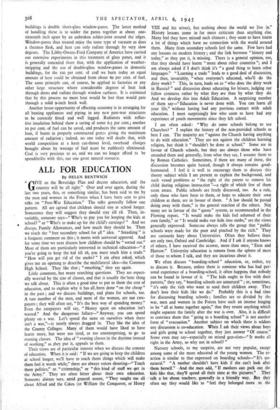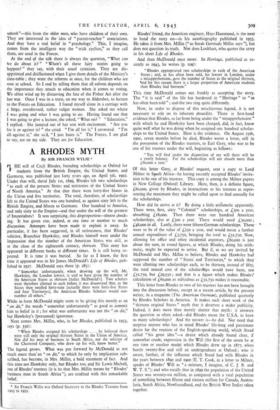ALL FOR EDUCATION
By HELEN BENTIVICH COVE us the Beveridge Plan and decent education, and the country will be all right." Over and over again, during the last two years, this, or something similar, has been said to me by the men and women in the Forces when I have been sent to give talks on " Post-War Education." The talks generally follow one pattern. All are agreed that children should stay at school longer. Sometimes they will suggest they should stay till 18. Then, in- variably, someone says—" Who's to pay you for keeping the kids at school? " or " Who's to make up for the child's earnings? " And we discuss Family Allowances, and how much they should be. Then we reach the " free secondary school for all " idea. " Smashing " is a frequent comment on this ; it meets with universal approval. And for some time we next discuss how children should be " sorted out." Most of them are particularly interested in technical. education—" if you're going to keep the kid till 16, you must teach him a trade." " How will you get rid of the snobs? " I am often asked, which gives me an opening to describe the multilateral idea—the Common High School. They like that ; " smashing," they say again.
Little comment, but many searching questions. They are especi- ally worried by the size of classes, and that is usually the'next thing we talk about. This is often a good time to put to them the cost of education, and to explain why it has all.been done " on the cheap " in the past ; and we discuss buildings, and plans for schools, too. A vast number of the men, and most of the women, are not rate- payers ; they will often say, " It's the best way of spending money." Even the ratepayers will say, " Money spent on education isn't wasted." And the dangerous fallacy—" Anyway, you can spend plenty on a war. Let's spend the same on ourselves when there isn't a war,"—is nearly always dragged in. They like the idea of the County Colleges. Many of them would have liked to have learnt more, but were too tired, or too unenterprising, to go to evening classes. The idea of " evening classes in the daytime instead of .working," as they put it, appeals to them.
Their views are of particular interest when we discuss the content of education. When it is said: " If we are going to keep the children at school longer, we'll have to teach them things which will make them feel it worth while," there are always voices shouting—" Teach them politics," or." citizenship," or "this kind of stuff we get in the Army." They are often bitter about their own education. Someone alWays says, amid general assent, "They taught me all about Alfred and the Cakes (or William the Conqueror, or Henry
VIII and his wives), but nothing about the world we live in." History lessons come in for more criticism than anything else.
Many feel they have missed such chances ; they seem to have learnt a lot of things which have no connection with the world around them. Many from secondary schools feel the same. Few have had any lessons on modern history ; and the link between " history and today," as they put it, is missing. There is a general opinion, too, that they should have learnt " more about other countries "; and I am always asked if I don't think it's " a good thing to learn other languages." " Learning a trade " leads to a good deal of discussion, and then, invariably., "when everyone's educated, who'll do the dirty work? " This, in turn, leads on.to " who does the dirty work in Russia? " and discussion about educating for leisure, judging our fellow creatures rather by what they are than by what they do.
And we develop this into Adult Education. A surprising number of them say—" Education is never done with. You can learn all your life," without having had any previous contact with adult education. I meet surprisingly few who seem to have had any experience of youth movements since they left school.
I am often asked: " Why do some schools belong to tne Churches? " I explain the history of the non-provided schools as best I can. The majority are " against the Church having anything to do with education." They are not against the children learning religion, but think it "shouldn't be done at school." Some are in favour of Church schools, but they are always those who have attended them and generally, from what they say, I assume them to be Roman Catholics. Sometimes, if there are many of these, the discussion becomes quite heated, though it always remains good- humoured. I feel it is well to encourage them to discuss this thorny subject while I am present to explain the background, and such vexed problems as " the right of the parent to remove his child during religious instruction "—a right of which few of them seem aware. Public schools are freely discussed, too. As a rule, only those who have been to them, or hope to educate their own children at them, are in favour of them. " A law should be passed doing away with them," is the general reaction of the others. Not many are in favour of the " quota" system, as recommended in the Fleming report. " It would make the kids feel ashamed of their own family," or " It would make our kids into snobs," are the views generally expressed. Someone always tells the group that "public schools were made for the poor and pinched by the rich." They are curiously hazy about Universities. Often they believe there are only two, Oxford and Cambridge. And if I ask if anyone knows of others, I have received the answer, more than once, " Eton and Harrow." University education is remote from the sphere of most of those to whom I talk, and they are incurious about it.
We often discuss " boarding-school " education, or, rather, try to discuss it. Because, unless there is someone who has had per- sonal experience of a boarding-school, it often happens that nobody can be found in favour of it. " The kids ought to live with their parents," they say, " boarding schools are unnatural " ; or, sometimes, " it's only the rich who want to send their children away. They don't love their kids like we do." Probably this is a bad time for discussing boarding schools ; families are so divided by the war, men and women in the Forces have such an intense longing to be " all at home together again," that they resent anything which might separate the family after the war is over. Also, it is difficult to convince them that " going to a boarding school" is not another form of " evacuation." Another subject on which there is seldom any discussion is co-education. When I ask their views about boys and girls going to school together, they just answer "Of course." Some even may say—especially on mixed gun-sites—" It works all right in the Army, so why not in school? "
Nursery schools, to my surprise, are not very popular, except among some of the more educated of the young women. The re- action is similar to that expressed on boarding schools—" It's un- natural." " A mother shouldn't have kids if she can't look after them herself." And the men add, " If mothers can park out the kids like that, they'll spend all their time at the pictures." They talk a lot about -teachers, generally in a friendly way. But they often say they would like to "feel they belonged more to the school"—this from the older men, who have, children of their own. They are interested in the idea of " parent-teacher " associations. And they have a real belief in " psychology." This, I imagine, comes from the intelligent way the " trick cyclists," as they call them, are used in the Forces.
At the end of the talk there is always the question, " What can we do about it? " ""When's all these fairy stories going to happen? " they say, with their usual cynicism. They are dis- appointed and disillusioned when I give them details of the Ministry's time-table ; they want the reforms at once, for the children who are now at school. So I end by telling them that all reform depends on the importance they attach to education when it comes to voting. We often wind up by discussing the fate of the Fisher Act after the last war. Once I was in a train, on my way to Aldershot, to lecture to the Forces on Education. I found myself alone in a carriage with a large, overdressed, rather vulgar woman. She asked me where I was going and what 1 was going to ao. Having found out that I was going to give a lecture, she asked, " What on? " " Education," I replied. • She jumped out of her seat with excitement. "Arc you for it or against it? " she cried. " I'm all for it," I answered. " I'm all. against it," she said, " I just hates it." The Forces, I am glad to say, are on my side. They are for Education.



























 Previous page
Previous page